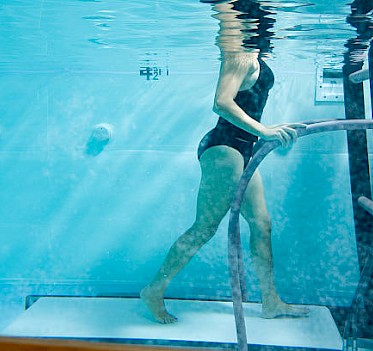Get To Know Aquatic Therapy
HealthCARE Express Occupational and Physical Therapy clinic is home to one of the two aquatic therapy pools in the Texarkana metropolitan area. At HCE Occupational and Physical Therapy, you can receive great care while recovering and improving your daily activities. Aquatic therapy can help people with many different ailments and injuries recover in a safe and low-impact environment.
Aquatic therapy isn’t just some new fad in physical therapy. It’s been around for a very long time! Aquatic therapy can trace its roots back to Ancient Greece and Rome! Many ancient Greeks and Romans bathed in hot springs to help improve their circulation and to relax their muscles. Hippocrates, often thought of as the father of medicine, even recommended a form of aquatic therapy to help treat people with different illnesses and physical ailments. In Japan, hot spring onsens are still used to help treat chronic pain and skin or menstrual issues.
Don’t get aquatic therapy mixed up with aquatic exercise. It is developed to provide rehabilitation to patients and requires a trained professional to perform the treatment. Unlike aquatic exercise, aquatic therapy is often a one-on-one experience with the patient and the provider. Movements and activities done in the pool are developed and chosen to suit individual patients’ needs. It’s even covered by most insurance!
Aquatic therapy helps patients improve flexibility, improve balance and coordination, builds muscle strength and endurance, increases aerobic capacity, assists with locomotion, and reduces stress. The natural pressure of water helps to create joint positional awareness, which helps with those recovering from sprains or torn ligaments.
Pools are kept at a comfortable, warm temperature to help relax the body and soothe aching joints and muscles. It also helps with joint swelling! The water’s buoyancy provides great resistance for muscle strengthening, all while reducing the effects of gravity on the body. It helps to decrease the stress put on joints to help make exercises and therapy much less painful to perform. This is especially helpful for those that need aquatic therapy for arthritis, those that are overweight, or those that are recovering from a broken bone or severe injury.
The following conditions can be treated with aquatic therapy:
-
Arthritis
-
Balance disorder
-
Chronic pain
-
Joint reconstruction/replacement surgery recovery
-
Lower back pain
-
Osteoarthritis
-
Orthopedic injuries
-
Parkinson’s disease
-
Multiple sclerosis
-
Rheumatoid arthritis
-
Sprains and strains
-
Stroke
-
Tendonitis
Aquatic therapy can be adapted to suit a patient’s individual needs. It is also helpful for those of all ages!
